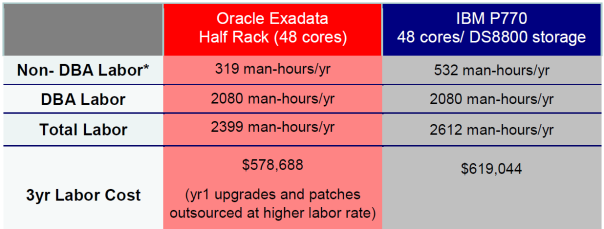According to Elbert Hubbard “One machine can do the work of fifty ordinary men. No machine can do the work of one extraordinary man”.
Of course, neither Exadata nor Bloom filters existed when the Bloomington born philosopher made the above statement.
Forbes magazine published an interesting article this month: Oracle’s Secret Sauce: Why Exadata Is Rocking the Tech Industry.
The article says: “The new approach is embodied in a technology strategy pioneered by Oracle and recently endorsed/followed by IBM (although IBM’s effort to date is rather modest): building richly integrated and fully optimized systems from the ground up, with hardware and software expressly created to work together to deliver maximum performance.”
And as you might guess from the image above, this time I am not only after the technical benefits and advantages of Exadata. I would like to clarify what they bring to business. And see how Oracle Exadata compares to IBM P-Series.
The FactPoint Group created a 30 page cost comparison report for business decision makers: Oracle Exadata Database Machine vs. IBM Power Systems.
In brief, the results of the report are:
• IBM 3 year TCO is 31% higher than Oracle.
• Exadata can be deployed more quickly and easily requiring 59% fewer man-hours than a traditional IBM Power Systems solution.
• Exadata requires 40% fewer sysadmin hours to maintain and operate annually, including quicker support calls because of less finger-pointing and faster service with a single vendor.
• Exadata delivers dramatically higher performance typically up to 12x improvement, as described by customers, over their prior solution.
• Will become even easier to operate over time as users become more proficient and organize around the benefits of integrated infrastructure.
• Supplies a highly available, highly scalable and robust solution that results in reserve capacity that make Exadata easier for IT to operate because IT administrators can manage proactively, not reactively.
Overall, Exadata operations and maintenance keep IT administrators from “living on the edge.” And it’s pre-engineered for long-term growth.
Check Kerry Osborne’s Oracle Blog for more details about the Exadata vs. IBM P-Series comparison.
I personally think that the benefits of Exadata are even much bigger granted the system is properly configured which I see is not always the case but as I said I will not comment on technical issues this time.
But after all, this is a DBA blog, so this part of the research might be of interest for most DBAs:
“For this emerging Database Machine Administrator (DMA) job category, IT employees are cross-trained to handle tasks currently undertaken by admin specialists in hardware, operating systems, network, applications or storage. IT managers who pursue this adaptive path likely will gain operational efficiencies for managing packaged solutions, although it may take several years as IT administrators are trained in new competencies.
The emergence of the DMA also may help restructure IT departments into more efficient operations, but the full benefits of this development cannot be fully realized until most older systems that demand a stove-piped IT organization are decommissioned and IT organizations adapt. At that time, IT operations managers may be able to reduce headcount. In time, packaged solutions should involve not only fewer workers but also fewer IT groups, which should reduce costs; in the meantime IT will be able to do more without adding headcount.”
That is very important! Let me quote here Paul Vallee, who in a recent discussion predicted that in the near future organizations will need few but very skillful DBAs, an opinion I 100% agree with!
“This change in job roles is not necessarily comfortable for everyone in IT because Exadata marginalizes various system administrators as it empowers the DBA: “The DBAs are doing more hardware tasks and diagnostics because most of the Exadata stuff is geared around database commands, not hardware commands or operating system commands. The gearheads have designed Exadata from the DBA’s perspective—when you look at the sys admin portion, it’s all written by a DBA, not by a Sys Admin,” lamented a System Administrator at a Business Services Co.
Other System Administrators have expressed similar sentiments as many of their traditional responsibilities shift towards the DBA—the source of the much of the operational savings we have identified.”
More on the DMA subject from Arup Nanda: Who Manages the Exadata Machine?
For all DBAs: here is an excellent book on Exadata: Expert Oracle Exadata, by Kerry Osborne, Randy Johnson and Tanel Põder.

